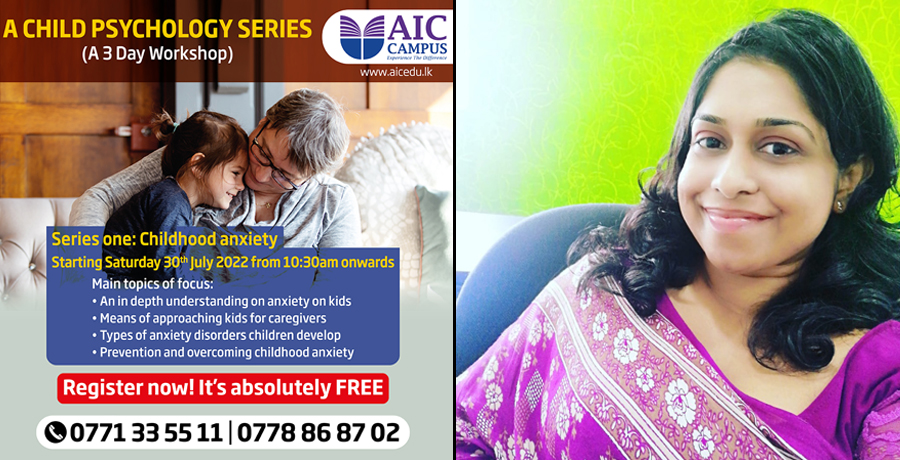One such effect that many of us face during this time is anxiety.
This is no different with children.
And it is important to consider that since children do not possess the necessary skills to express this distortion in their emotions, we from AIC campus decided to bring to light the issue to parents and primary care givers on how this condition effects kids and how we could apply ourselves to help them overcome this condition which is no small matter.
To understand anxiety on children, we spoke to Dr. Kalhari Pitigala, a Counseling Psychologist specializing with children and Adolescents, attempting to bring awareness on this debilitation.
In this interview we tackle the issue of anxiety in kids and go on to elaborate and discuss the various methods of identifying and coping with this very real issue.
Q: What is anxiety and how does it effect children?
Dr Kalhari: Anxiety is constantly worrying about something.
Having a fear or agitation within them which they do not know how to express on certain occasions.
When it is prevalent in kids, it is usually displayed in ways where they may have a displeasure of going to school and changes is moods specifically feeling angry, annoyed or at times distant from family and friends.
Everyone has some sort of anxiety at some point in their life and everyone at one point in life has experienced it, for eg: before sitting for an exam, public speaking or meeting someone new.
This state is experienced mostly in school settings and the early onset of this condition can possibly start from here, and in some unfortunate circumstances, interactions with family as well.
Q: What is the time the noticeable changes in anxiety arise in children? Is there a specific age range?
Dr. Kalhari: Well… something like separation anxiety can show up at a pretty young age, even in preschool kids and upwards.
Now Separation anxiety is similar to having the child being brought up by their grandparents for example, being instilled by their thoughts and beliefs and then all of this coming to have an end by having to move abroad suddenly.
As a result, kids become restless, problems with their sleep patterns arise and on some occasions even develop issues like asthma.
However, I am not sure if this correlation with asthma is present, but from the various literature that I’ve read it shows that such connections do exist.
Q: What are the different types of anxiety disorders present in children?
Dr. Kalhari: There are various anxiety related issues many adults face on a mere daily basis and children are unfortunately no exemption to the same disorders.
However, the way in which they experience it is different than that of adults.
Phobias, social anxiety, generalized anxiety are some of the forms of anxiety they experience.
Furthermore, children experiencing accidents or traumatic events can also be a factor of kids developing anxiety where they lose the drive to communicate often.
Stage anxiety is also a common type experienced by kids where while up on the stage, they begin to shiver, have dry mouth, palpitation, feelings of weakness, stammering, problems with memory recall on the stage which are all text book signs of anxiety.
Anxiety is not in every child but it depends on how they have been brought up.
What has been observed by primary caregivers is that some kids are scared of cockroaches and spiders and even as an adult develop these anxieties if not attended to.
Social anxiety is an extreme fear of being judged by others in social situations, and is especially present when parents keep comparing their kids to others, especially to their siblings, relatives and other peers in the child’s social circle. Comments like why can’t you do better than your sister/brother is best to be avoided.
Most parents fail to see that children are unique in their own way.
Children don’t know how to process these complexities of emotions in a correct way, and so they become upset and they suppress it.
This leads to it surfacing in other forms which are not necessarily healthy.
I would like to touch on OCD as well.
OCD or Obsessive-Compulsive disorder is also a common disorder related to anxiety.
In the Diagnostic and Statistical Manual (DSM) its classified as a separate disorder.
It is usually a comorbid condition.
It is an irrational thought that leads you to perform repeated activities.
For example – thought of having to keep checking the door or the compulsion to want something in order.
Q: What are the ways of approaching this problem?
Dr. Kalhari: It is always important to let them know that there is always a way out of any problem.
An extra dose of love is something that is very important, and letting them know how accepted and loved they are by the parents.
Just like how parents need the respect of the parents – children need the respect of their parent too.
Breathing techniques are also good ways of dealing with anxiety, as mentioned in various literature of alternative therapies.
Help the children to relax without burdening them with too much studies.
identity children’s unique characteristics, let them work according to a timetable so that they will be exposed to a variety of activities instead of one – let them focus on sports and extracurricular instead of just studies, also expose them to art therapy as it also helps them to relax and regulate their patterns of sleep.
Even yoga is a good practice for kids with anxiety, also focus on fulfilling the basic needs of the child – feeding and keeping them hydrated and avoid any form of caffeine as it is a stimulant and can trigger anxiety which can worsen the situation.
Also look for their personality traits – some children can be naturally shy – so as parents we need to help them connect with who they are instead of trying to change or put them down, we should avoid questions like why are you shy? Or why are you nervous? Instead we should talk to them with affirmations – such as you will get through this, or you are victory – inculcate positive attitude in them, help them to avoid negative/stressful events as much as possible and help them process emotions in the correct way.
Check for a first degree relative who has been diagnosed with anxiety – in that case you have to take extra precautions.
Mindfulness is also a very important factor.
In worse case scenarios there are medications that can be prescribed for them.
Q: Is medication prescribed for kids too?
Dr. Kalhari: Yes, they are, if there is mild anxiety it will not be prescribed, but if the child has severity anxiety various anti-anxiety medications will be prescribed based on the severity of the child’s condition such as keeping away from school, social interaction – then definitely it will be prescribed.
The psychiatrist will do the needful when it comes to the medication being prescribed based on the circumstances of the diagnosis at hand.
Anxiety is no matter to be taken lightly when it comes to the mental wellbeing of children.
Therefore, having an awareness of this condition aids not only the child but also their caregivers to maintain a sense of peace and consequently an overall development in the child.
If this is something that you as a parent or a caregiver need at this point of time, we from AIC campus invite you to a free series of three workshops on this debilitating condition free of charge commencing from the 23rd of July from 10.30 AM onwards.
A certification of participation will also be provided from AIC to all those who attend this event.
Don’t miss out on this opportunity!
























